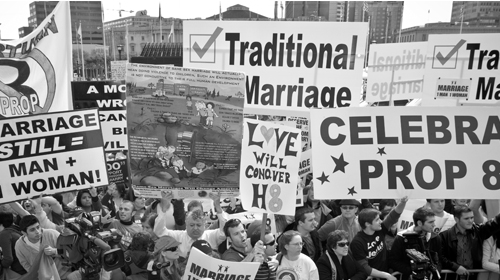ACLU Urges Critical LGBT and HIV/AIDS Updates to 2012 Democratic National Platform


The ACLU has been invited to offer our civil liberties and civil rights recommendations to the Democratic National Committee’s “platform drafting committee,” which is currently meeting in Minneapolis to begin the process of putting together the 2012 Democratic National Platform. While the ACLU is a nonpartisan organization, we welcome opportunities to infuse a respect for and commitment to civil liberties in the political process. We would also be pleased to offer our views to the Republican National Committee’s platform drafters.
Included as part of a range of civil liberties and civil rights issues are recommendations regarding LGBT rights and those who are living with HIV and AIDS. To be certain, at least one such issue – the freedom to marry for gay and lesbian couples – has garnered substantial attention and support over the past several months, but especially following President Obama’s landmark endorsement in May. The ACLU has long argued that the freedom to marry whomever we love and want to share our life with is fundamental to who we are and what we stand for as a country. The 2008 platform called for “equal responsibility, benefits, and protections” for same-sex couples. This language should be updated to reflect the basic truth that marriage matters to gay people in similar ways that it matters to everyone. Gay and lesbian couples want to get married to make a lifetime commitment to the person they love and to protect their families. Will 2012 be the year that a major American political party endorses the freedom to marry? Only time will tell.
Also related is the discriminatory so-called Defense of Marriage Act (DOMA). The 2008 platform commendably stated opposition to DOMA, but there has since been legislation introduced in Congress – the Respect for Marriage Act – which would completely repeal DOMA and provide married gay and lesbian couples with certainty that, regardless of where they travel or move in the country, they will not be treated as legal strangers under federal law. The 2012 platform should, in addition to stating opposition to the discriminatory DOMA, include a specific endorsement of this critically important legislation.
The 2012 platform should also include a call for passage of the Student Non-Discrimination Act, legislation in Congress which would establish a comprehensive federal anti-discrimination prohibition in all public elementary and secondary schools based on a student’s sexual orientation or gender identity. The tragic reality for far too many LGBT students is that discrimination and harassment are part of their daily lives at school. Amazingly, in the year 2012, there still is no federal law that explicitly protects students on the basis of sexual orientation or gender identity in our nation’s schools. The 2008 platform stated a commitment to “close the achievement gap in education and provide every child a world-class education.” The reality is that discrimination and harassment greatly hinder a student’s ability to obtain a world-class public education.
The Student Non-Discrimination Act would have a profound impact in improving the lives of LGBT students in the U.S. by ensuring that discrimination and harassment of students on the basis of their sexual orientation or gender identity has no place in our nation’s public elementary and secondary schools. The legislation was endorsed by the Obama administration in April, and the 2012 platform should include a specific endorsement of it, recognizing it as essential to the goal of securing a world-class public education for all students irrespective of their sexual orientation or gender identity.
Finally, in the area of HIV/AIDS, the 2012 platform should include a call to end stigma and discrimination against those who are living with HIV and AIDS, as well as strengthened enforcement of civil rights laws, such as the Americans with Disabilities Act. The 2008 platform stated a commitment to “fight HIV/AIDS in our country and around the world,” as well as a specific call to support the development of a “comprehensive national strategic plan to combat HIV/AIDS.” In July 2010, the National HIV/AIDS Strategy for the United States was released. Among the many important recommendations included in the national strategy is one to reduce stigma and discrimination against people living with HIV. Its inclusion was based on the recognition of the persistent discrimination those living with HIV face, and the harm it does to efforts to fight the disease and limit its spread.
Inclusion of these recommendations in the 2012 Democratic National Platform would embrace an America where LGBT people can live openly, with respect for their identities, relationships, and families, and where there is fair treatment on the job, in schools, housing, public places, health care, and government programs; and an America where discrimination based on HIV status has ended, and in which the government’s HIV policy promotes public health and respect and compassion for people living with HIV and AIDS.
While the ACLU is presenting these recommendations to the DNC’s platform drafters, these are recommendations that people from across the political spectrum should be able to embrace. Civil liberties, including LGBT rights and protections for those living with HIV/AIDS, are not partisan issues.
Learn more about LGBT rights: Subscribe to our newsletter, follow us on Twitter, and like us on Facebook.

